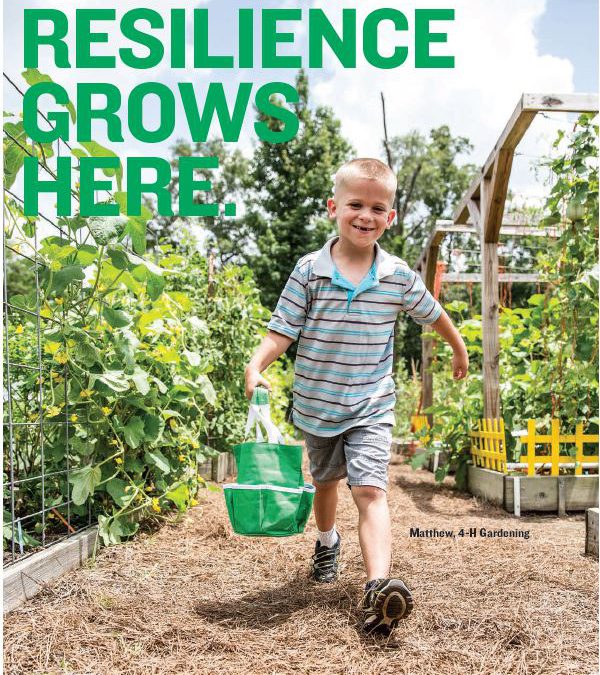
by Jena Gilmore | Mar 27, 2020
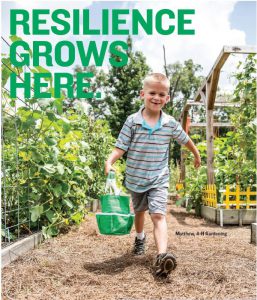 4-H is known for creating safe and inclusive environments. Many may argue this could be incredibly difficult now in the wake of the Coronavirus sweeping Florida, however, where some may see resistance, 4-H shows our resiliency. Across Florida, 4-H Agents have been brainstorming a multitude of ways to continue serving their clientele and practicing what we pledge by…
4-H is known for creating safe and inclusive environments. Many may argue this could be incredibly difficult now in the wake of the Coronavirus sweeping Florida, however, where some may see resistance, 4-H shows our resiliency. Across Florida, 4-H Agents have been brainstorming a multitude of ways to continue serving their clientele and practicing what we pledge by…
”My Head to clearer thinking, my Heart to greater loyalty, my Hands to larger service and my Health to better living, for my Club, my Community, my Country, and my World.
Within the Northwest District, there are currently many alternative programs to engage our 4-H members and volunteers during this time of “social distancing.” Interactive meetings, webinars, and interviews are provided through online streaming platforms that allow members to call in or connect via their smartphones, tablets and computers. Other alternatives include utilizing Youtube Channels or Facebook to stream recorded videos of activities for youth and adults. Consider exploring some of our many options below and join us on our new virtual adventure in experiential learning 4-H style!
Virtual Opportunities for Youth
Embryology, which is typically delivered as a school enrichment program, can now be viewed live on some county 4-H websites and Facebook pages. Agents and 4-H volunteers are also offering virtual livestock judging options so judging teams can continue to build their knowledge base for competitions along with Virtual Farm Tours in some areas. Other counties are banding together to deliver daily activities for youth via recorded series posted on their Facebook pages that highlight different themed days of the week.
- Escambia County 4-H Virtual Embryology Experience
- Register via their Eventbrite for full access to videos, webinars and resources
- 4-H Life Skills Masters Daily Series via Holmes & Walton 4-H County Facebook Pages
- Daily themes with activities include: Make It Mondays, Tasty Tuesdays, Water Wednesdays, Tackle It Thursdays & Fitness Fridays
- Washington County 4-H Project Showcase via Flipgrid
- Compete within your 4-H Showcase project area virtually with Mrs. Julie
- Jackson County Virtual Poultry Judging
- Jackson County Agriculture Virtual Day Camps
- This series is posted on their Facebook page and can be reviewed even after the event!
- Freezer & Fridge hacks with Calhoun County 4-H
- Learn tricks and tips of preserving all those extra groceries during your COVID-19 prep
- Liberty County 4-H detEGGtives investigate the 21-day countdown to Hatching with my Peeps
- Wakulla County 4-H shares Facebook Live daily updates and content from across Florida 4-H
- Leon County 4-H takes you on a virtual farm tour!
- Leon County 4-H Virtual Showcase
- Compete virtually and potentially win cash prizes for your clubs along with individual prizes and recognition…WIN:WIN!
Virtual Opportunities for Volunteers
Volunteer based programming has shifted to virtual as well! Currently, each month a webinar is hosted which highlights different topic areas related to delivering a well balanced 4-H program to your club members. Topics so far have included Preparing for County Showcase (aka County Events), Professional 4-H Portfolio Tips, and 4-H Project and Record Book Tips. You can register for the Virtual Volunteer Leadership Academy through our Eventbrite link and receive calendar invitations, reminders, and links so you can tune in LIVE or watch the recorded sessions later. Our team also provides you with all the resources discussed in each section. Registration is required and can be found at http://bit.ly/4HVVLA
4-H Virtual Volunteer Leadership Academy
- April- Awards & Recognition
- September*- Judging Contests
- October*- Preparing for Exhibits & Shows
*Fall session registration will be available July 1, 2020.
Subscribe to our NW District YouTube Channel for recorded sessions
If you would like to learn more about the 4-H opportunities available in your county, please contact your local UF IFAS County Extension Office, or visit http://florida4h.org. Now is a great time to join the 4-H family!
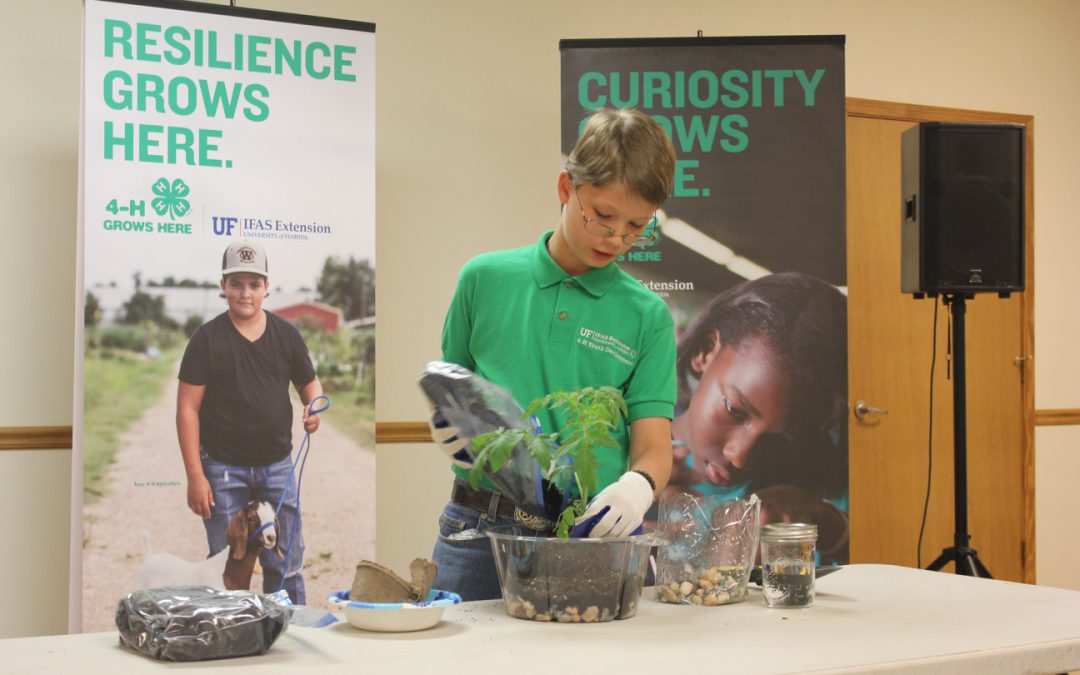
by Jena Gilmore | Mar 13, 2020
It’s finally here! Like many of us, you’ve probably been counting down the days since Christmas break for the next hiatus from the chaotic school day routine. Now, with Spring Break upon you…what are you going to do with the kids while working or running errands that have piled up and marking off that “to do” list? It’s time to “phone a friend,” your Positive Youth Development friends (aka 4-H Agents) that is!
Set yourself up for success this Spring Break by planning some fun projects to complete with your youth. Many of these projects they can do independently, or with a group of friends, or tackle with the whole family. 4-H makes learning FUN through experiential learning opportunities the whole family can enjoy!
4-H PROJECT LEARNING
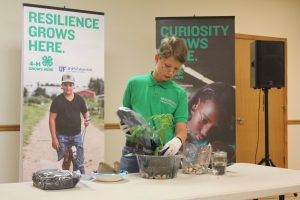
Walton County 4-H’er during his container gardening Demonstration at County Showcase!
4-H members can choose from more than 50 projects that focus on science, engineering and technology, animals and agriculture, food & nutrition, outdoor adventures, marine science, public speaking, art and wildlife. 4-H learning is experiential- or “hands on learning,” where youth get to interact with the curriculum or subject matter being taught/explored.
Ultimately, youth learn life skills and use these skills to give back to their communities. Youth set goals, keep records and can participate in events and activities on a county, district, state, and national level to expand their learning! They can explore the various projects and programs 4-H offers and choose one that interests them.
4-H has three major priority programs: Science, Citizenship & Leadership, and Healthy Living. Please check out the resources available in each of these areas and consider exploring other aspects with your local 4-H program. Your local 4-H office may be hosting “day camps,” or daytime activities over Spring Break which youth can register for and spend the day in a safe, inclusive environment exploring with youth their age!
Below are a few projects youth can dig into with many simple household items. For a greater challenge, expand on these projects so that youth can create their own demo to share with their local 4-H program during club meetings or County Showcase to earn more credit, experience, and leadership within their clubs!
GARDENING
A perfect project for youth of all ages…the newspaper pot! Not only are you recycling, but you can learn about propagating plates, soil science, and so much more with some extra research. Turn it into a family challenge to see who can make theirs the fastest, the most decorative, the largest…the possibilities are endless with this project!
https://nwdistrict.ifas.ufl.edu/4hn/files/2015/04/HANDOUT_PottedPlantColorPrint.pdf
HEALTH
In the midst of all the wacky weather lately, take some time to explore different aspects of one of our H’s…Health! The links below are just a few within a series of activities focused on Healthy Living. In the “Let’s Go Green” series, youth will learn how to create safe alternatives to chemical cleaning solutions and YOU (the guardians) get to benefit as they “test” the effectiveness of these cleaners throughout the house. Make it a challenge…encourage them to test different areas, the kitchen, the bathroom, the windows…have you caught our major hint yet? Additionally, youth can expand on their learning by using the link below to create their own newspaper to showcase their findings. Utilize the “Headlines for Health Introductions” to explore more activity options like “Let’s Go Green.”
Make a Newspaper: http://edis.ifas.ufl.edu/pdffiles/4H/4H28000.pdf
4-H is one of the nation’s most diverse organizations, open to all youth, ages 5-18, and available in every community. For more information on how youth can join or the many 4-H projects available, contact your local UF/IFAS County Extension Office, or visit http://florida4h.org today.
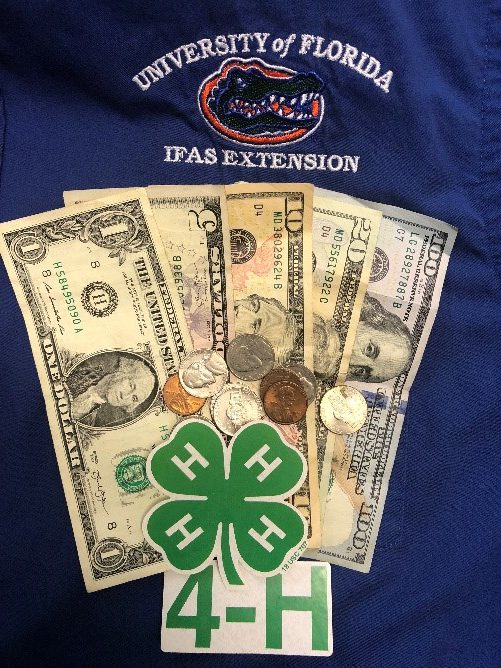
by pmdavis | Jan 10, 2020
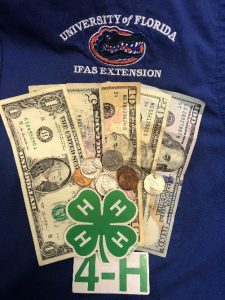
Are you financially savvy?
As a parent, I worry about children and their money habits! They often have trouble distinguishing between a need and a want. I often wonder if I am empowering them to be financially savvy. I know this is a topic that I continually work on for myself. It is important to start teaching healthy money habits early! It is also important for children to hear about personal finance to understand how money works in a variety of settings: home, school, and youth organizations. I know my children receive money as gifts and it tends to “burn a hole in their pocket” until it is gone. Like adults, children need to practice making “healthy financial” decisions so that those decisions become “healthy habits,” reducing stress in their lives.
With Valentine’s Day right around the corner, you might think of helping your children or grandchildren start a savings account to provide some financial security for the future. Then, encourage them to keep adding 10-20% of any money they receive to the account for a rainy day or that big purchase they desire.
RESOURCES AVAILABLE
Extension and 4-H have several publications and project books that provide guidance in the area of personal finance on spending, saving, investing, and donating. These projects can be done in a group setting or as a self-study project. National 4-H Curricula include “Financial Champions 1: Money FUNdamentals.” This piece has activities allowing kids to develop a money personality profile and style, understand the difference in needs and wants, make informed money decisions, set financial goals, and develop a money plan.
“Financial Champions 2: Money Moves” allows kids to learn how to predict outcomes and analyze their finances. They calculate interest; determine the cost of credit; learn how to manage a checking account, explore selecting financial services, make informed marketplace decisions and discover ways of handling money. National 4-H also has free curricula you can download for older youth.
UF/IFAS Extension also has free resources about money and financial management for adults and families on a wide range of topics such as Consumer Rights, Credit and DebtManagement, End of Life Issues, Finance and Family, Personal Finances Insurance, Retirement Planning, and Saving and Investing. University of Maryland 4-H also has a program called Financial Nuggets. This is a free download giving ideas on how to teach financial decision making to youth. It is designed for family involvement. Therefore families will increase their basic financial capacity and ability to make both short-and long-term decisions regarding spending and saving. It explores topics like needs verses wants, planning and managing money using a budget, how wealth is created and built, and managing risks.
Extension and 4-H want to encourage children, teens, and families to learn about personal finance, to practice what they learn and to teach others. We really want to get 4-H members and their families on the road to being money smart consumers. For more information on financial education and tools to help you become financially savvy or get out of debt, contact your local UF/IFAS County Extension Office, or visit http://florida4h.org. 4-H is one of the nation’s most diverse organizations and includes people from all economic, racial, social, political, and geographic categories. There are no barriers to participation by any young person. Participants are given the opportunity to engage in activities that hold their personal interest, while being guided by adult volunteers. If you are interested in volunteering, please contact your local office.

by pmdavis | Aug 9, 2019
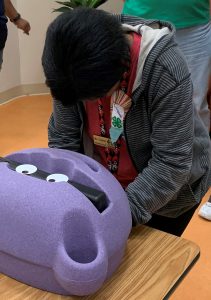
Looking for spots missed during hand washing by using black light and glow germ lotion that fluoresces under black light.
It’s hard to believe it is August already, with that we are getting ready to go back to school. Going back into the large group gathering requires a reminder to wash your hands often. You and your child will be around so many people and exposed to all kinds of germs. Regular hand washing helps you avoid getting sick and spreading your germs to others.
The CDC recommends that we wash our hands:
• Before, during, and after preparing food
• Before eating food
• Before and after caring for someone who is sick
• Before and after treating a cut or wound
• After using the toilet or after changing diapers or cleaning up a child who has used the toilet or been ill
• After blowing your nose, coughing, or sneezing,
• After touching an animal, animal/pet feed or treats, or animal waste
• After touching garbage
Take a moment to sit down and talk with your child about hand washing and the importance of washing their hands, especially when they get home from school.
Try this activity written by Tennessee 4-H to help youth see where they may be missing germs. This simple activity uses items you probably have in your kitchen. Begin by coating hands with a tablespoon of cooking oil. Next, sprinkle the oily hands with ground cinnamon. Have your child wash their hands using the steps outlined below. Once they have finished washing, have them smell their hands to see if they can still smell cinnamon. If they washed their hands correctly, the cinnamon smell and brown color should be gone from their hands.

A. Hands coated with cinnamon before hand washing
B. Quick wash like youth often do missing in between fingers, top of wrist, around nails
C. Thoroughly washed hands (all clean even between fingers)
Here are the steps we teach youth when they take our 4-H hand washing classes:
1. Wet your hands with clean, running water.
2. Apply soap and rub your hands together to make a lather. Make sure to get in between your fingers, under your nails, and on the top of your hands. Youth often miss these areas when we do a lesson on hand washing during 4-H events.
3. Scrub for at least 20 seconds—about the same amount of time needed to sing the Happy Birthday or ABC Song twice.
4. Finish by rinsing your hands with warm running water.
5. Dry hands with a clean towel or let air dry if a towel is not available.
6. Use the towel to turn off the water faucet to prevent re-contamination of your clean hands on a dirty faucet knob.
Have a fun and germ free day! 4-H is a family affair, offering many opportunities where both children and parents can participate in common interests. 4-H is one of the nation’s most diverse organizations and includes people from all economic, racial, social, political, and geographic categories. There are no barriers to participation by any young person. Participants are given the opportunity to engage in activities that hold their personal interest, while being guided by adult volunteers.
To find out more information about other 4-H programs like this or volunteer your time to work with youth, please contact your local UF IFAS County Extension Office.
by Allison Leo | Jul 26, 2019
Mindfulness is the act of creating awareness of your surroundings, emotions, and physical self in the present moment. It helps you connect to the world around you, while providing cognitive, social, and emotional benefits. Practicing mindfulness is not just for adults. Children can reap a multitude of benefits from learning and practicing mindfulness. Mindfulness equips children with the ability to adjust and deal with conflict encountered in their daily lives. It can also help children foster an optimistic outlook in life, react to stress in a healthy way, and develop a positive self-concept.
The practice of mindfulness is foreign to many adults, making it tricky to teach young children. The best thing to do is keep the message simple and model the behaviors you are teaching. Being taught by an adult that models mindful behaviors daily will assist kids in mastering the techniques. Below are a few mindfulness activities you can do at home as a family or in a group learning environment, such as a 4-H club meeting.
Zen Garden
A zen garden is a miniature landscape made with items such as moss,
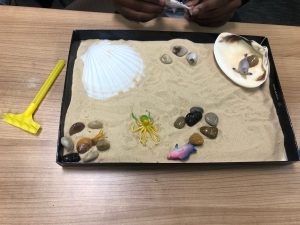
Zen garden created during Leon County 4-H Mindfulness Camp
rocks, and water features. Zen gardens are filled with sand and contain a small rake that you can use to create designs in the sand. The motion of raking the sand creates a sense of calmness. Zen gardens are often found on desks in the workplace because they are known for building focus and reducing stress. Building a zen garden is a fun and easy activity you can do with kids. Use a shoebox lid as the base and collect various stones and other items from outside to fill the box. Small rakes and sand can be purchased at a local craft store.
Mindful Safari
Taking a nature walk around your neighborhood or park is a simple way to exercise your mindfulness skills. Make it exciting by telling them you are going on a “mindfulness safari” and the goal is to see how many different birds, insects, and animals you can find on your journey. By searching for these items, you are fostering an awareness of the world around you. Similar to the mindful safari activity, you can take children on a “sound hunt.” This activity teaches kids to increase their awareness of the sounds in their environment. You can make the “sound hunt” more challenging by asking them to distinguish which sounds are close and which sounds are far.
Breathing
Breathing exercises are an important tool children can use to practice mindfulness. Learning how to control your breath and increase awareness of your breathing can help clear your mind in times of distress. You can practice breathing anywhere and no equipment is needed. Have kids sit on the floor or lie down. Instruct them to close their eye and take a huge breath in, filling up their lungs. Count to three and have them release. Breath activities can be completed sitting or lying down on your back. It is a good practice to have kids place their hands on their belly to feel the breath as it enters and leaves the body.
Mindful Eating
Mindful eating teaches children to understand when they are hungry and when they are full. It is important to eat without distractions, such as the television or your phone. Provide them with a variety of snack items. Ask them to look, listen, touch, smell, and taste the food in steps. They should pause after each step to reflect on what their senses are showing them about their food. First, look at what colors and shapes the item has. Next, listen to see if your food is making any sounds. Then, feel your food and describe the texture. Smell the item and define the scent. Finally, taste the food while paying attention to how the food feels and if the flavors change.
Yoga & Balancing
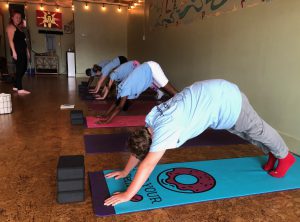
Practicing our “downward dog” pose during Leon County 4-H Mindfulness Camp.
Yoga is a great way to practice concentration, balance, and connection. Kids enjoy trying different yoga poses and stretches. A variety of free educational videos are available online that you can use to help guide you and your child through yoga sequences. Breathing techniques can be coupled with yoga and balancing. If kids do not have a yoga mat, a towel can be used. Practicing yoga shows kids that mindfulness does not always mean you are still or quiet.
Mindful Drawing
It is important to keep distractions to a minimum while drawing. This can be achieved by putting on relaxing music or simple sounds, such as rain falling or waves crashing. There are a variety of different drawing activities you can do with kids to practice mindfulness. If you have different sounds available, you can select a sound and instruct them to close their eyes and think of what that sound looks like to them. Then, have them open their eyes and draw what they heard. You can repeat this activity a few times with different sounds.
Body Appreciation
This activity works best in a group learning environment. Have kids break up into pairs and instruct them to take turns tracing each other on a large sheet of paper. Once everyone is finished, they will focus on their own bodies and write or draw what each body part does for them. For example, they can write “my head helps me think” or “my legs help me run.” Finally, they will write positive words on their body such as “I love to read.” This activity makes kids reflect on all the important ways their body helps them each day. It teaches them to appreciate and love their body.
Gratitude Journal
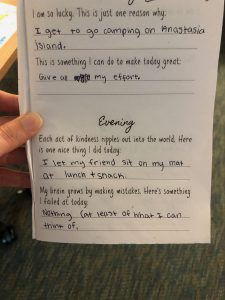
Gratitude Journals are a simple mindfulness activity kids can complete every day
When we feel and express gratitude to people in our lives, it creates loving connections, builds trust, and makes us feel joyful. Gratitude can be shown by giving someone a hug or telling them how much you appreciate them. Gratitude journals can easily be made at home or you can print off a pre-made template. This version is simple and is a great start for kids: https://researchparent.com/gratitude-journal-for-kids/
For more information on how your family can learn more healthy activities such as these mindful ones, find your local UF IFAS Extension Office and contact your 4-H Agent to explore what 4-H programs are offered in your area.
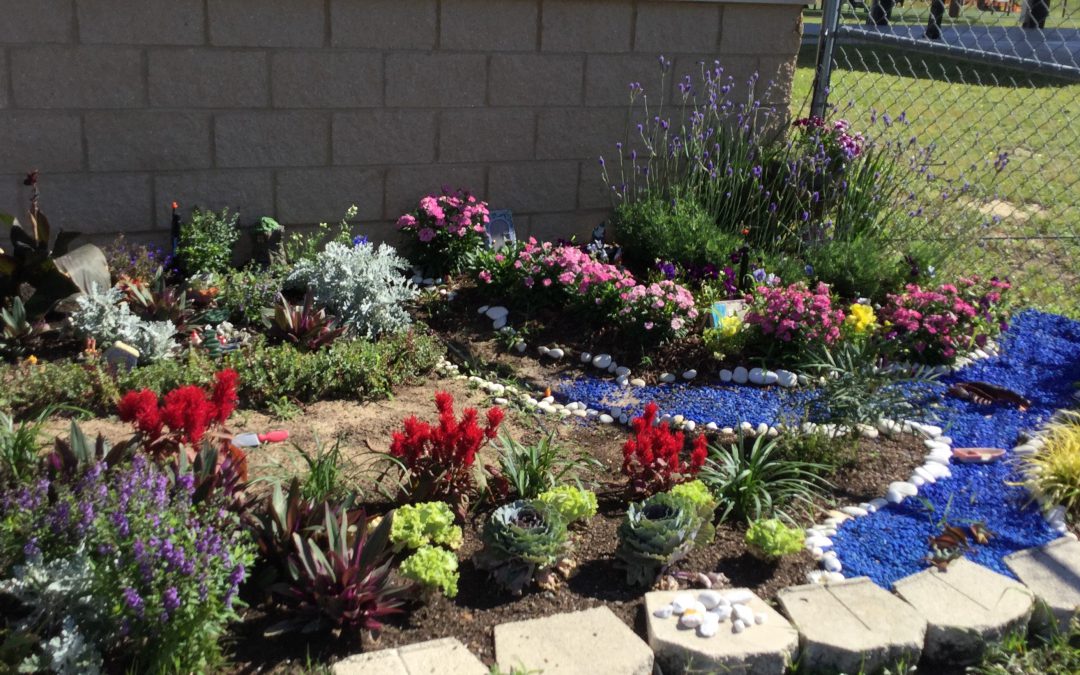
by pmdavis | Jul 5, 2019
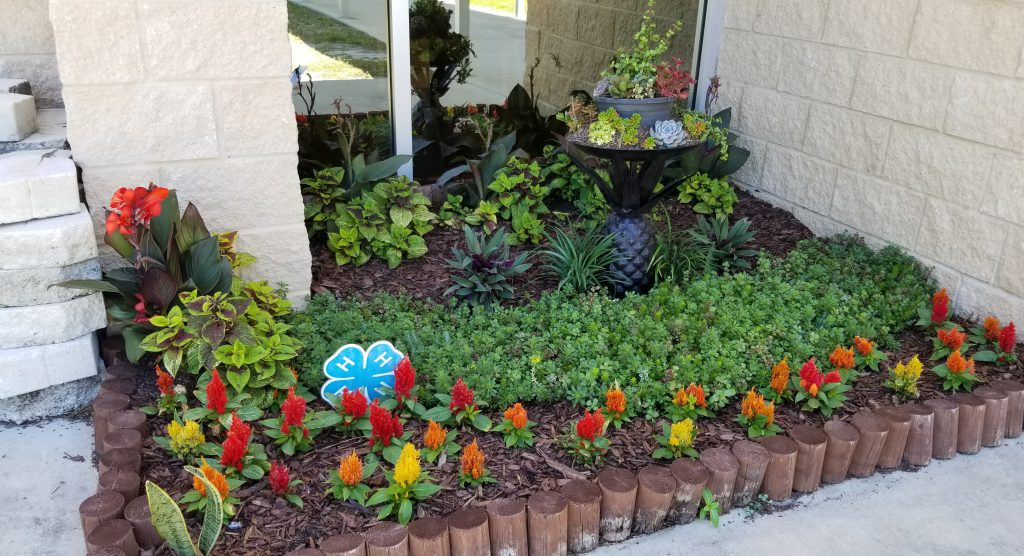
Succulent garden at entry of NSA-PC Youth Center
In September 2018, Ms. Bettina started the 4-H Garden Club at NSA-PC in Panama City, Florida. She had big plans for the garden and couldn’t wait to get started. These Navy youth, led by a caring adult staff member, started their 4-H journey. Then Hurricane Michael came, which devastated the area on October 10, 2018 and could have easily derailed all of their plans. Instead, the storm allowed youth to start with a clean slate and a renewed sense of vigor in rebuilding the garden at the NSA-PC Youth Center. The youth redesigned some of their beds using debris from the storm.
When the Youth Center reopened following the storm, most of the outdoor areas were off limits to the kids due to damage from the storm. That meant that the playground and other outdoor activities were not available. However, the 4-H Garden Club was allowed to function and allowed the youth itching to be outside and yearning for a way to cope with the devastating effects of Hurricane Michael to come together as a team and, along with Ms. Bettina, a garden to restore a sense of balance and ownership.
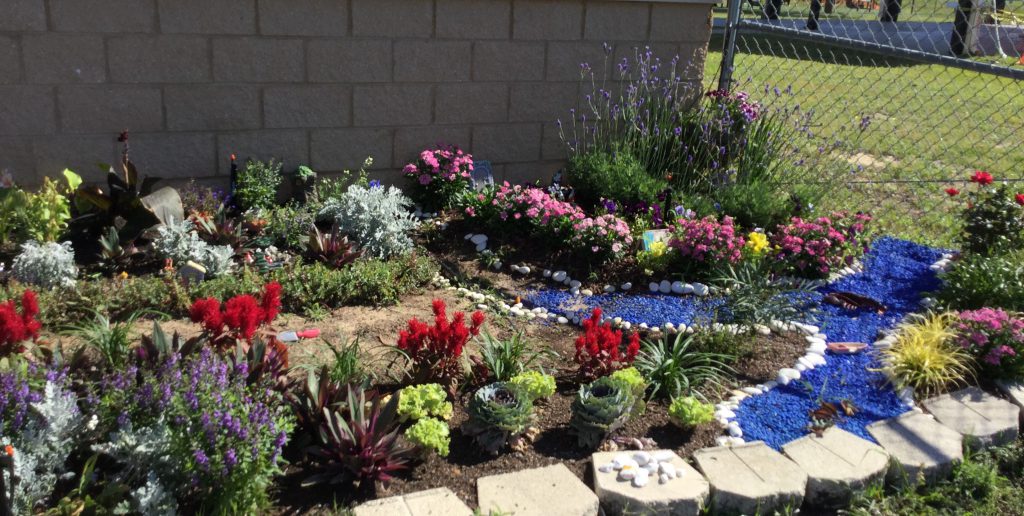
Whimsical garden bed designed by NSA-PC youth
The kids were eager to get started planning, implementing, and maintaining the new garden area. They created a plan for different types of gardens within their facility spaces. They researched which plants were best suited for the season and zone as well as which flowers would attract pollinators, because they hoped to see hummingbirds and butterflies. Ms. Bettina says that the kids came in every day asking if they were going to get to work in the garden. It created a healthy, active, and creative outlet for all involved. Soon the garden began to take shape with imaginative details and originality everywhere you looked.
All visitors to the Youth Center are welcomed by exquisitely maintained flower beds that surround the entrance to the building. The youth have created and maintained a beautiful area that enhances the building and greets visitors with beauty and color. These raised gardens are filled with hardy greenery as well as seasonal color and elevated containers that hold a cascade of many varieties of succulents.
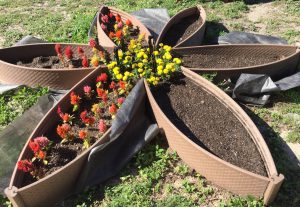
NSA-PC youth recycled old materials to create a new space to hold their flowers.
The 4-H Garden Club at NSA-PC is a perfect example of how sometimes a storm that seemingly derails plans actually presents an opportunity for growth, learning, and creating something more beautiful. Ms. Bettina’s 4-H Garden Club could not have come at a more perfect time. The gardening activities allow the youth to get outdoors while learning about different types of plants and how to care for them. Many students initially joined the Garden Club to get outside after the storm due to the playground closure. Youth participating in the 4-H Garden Club at NSA-PC have learned about more than just the science of plants; they are learning to work as a team with improved communication skills in order to continue maintaining their garden as well as environmental awareness and recycling by taking used items to make new treasures for their flower beds.
4-H is one of the nation’s most diverse organizations and includes people from all economic, racial, social, political, and geographic categories. There are no barriers to participation by any young person. Participants are given the opportunity to engage in activities that hold their personal interests while being guided by adult volunteers. If you would like to learn more about 4-H programming in your local area, or how to get involved as a 4-H volunteer, please contact your local UF IFAS County Extension Office, or visit http://florida4h.org.
RESOURCES
For more tips and ideas to help build your personal garden, visit http://edis.ifas.ufl.edu/ as there are many documents available to help build your personal gardens.
This article was written by Jennifer Sims and Paula Davis.

 4-H is known for creating safe and inclusive environments. Many may argue this could be incredibly difficult now in the wake of the Coronavirus sweeping Florida, however, where some may see resistance, 4-H shows our resiliency. Across Florida, 4-H Agents have been brainstorming a multitude of ways to continue serving their clientele and practicing what we pledge by…
4-H is known for creating safe and inclusive environments. Many may argue this could be incredibly difficult now in the wake of the Coronavirus sweeping Florida, however, where some may see resistance, 4-H shows our resiliency. Across Florida, 4-H Agents have been brainstorming a multitude of ways to continue serving their clientele and practicing what we pledge by…












